SPONSORED BY GSK
With an estimated 61,000 new cases every year (American Cancer Society, 2024a), endometrial cancer has become an increasingly threatening cancer to people in the U.S., and we’re still not talking about it enough.
Endometrial cancer (also known as uterine cancer) is a type of cancer found in the inner lining of the uterus, which is known as the endometrium (American Cancer Society, 2024a). It is the most common type of cancer that affects the female reproductive organs, and it’s more common in the Black community than it is in the White community (Whetstone S, Burke W, Sheth SS, et al., 2022).
To get this vital information to those who need it the most, we spent time with Nathalie McKenzie, MD, MSPH, of Florida Advent Health Cancer Institute in Orlando, Florida, who provided a healthcare professional's point of view about how you can better advocate for yourself and your health.
When asked about the latest research in endometrial cancer, Dr. McKenzie responded, "Unfortunately there is some data that shows that Black people are dying at higher rates from uterine cancer than other race groups, and that to me has been particularly alarming” (Whetstone S, Burke W, Sheth SS, et al., 2022). The data that Dr. McKenzie referenced explains that this is likely due to several reasons, including that Black people are more likely to have advanced disease at the time of diagnosis than White people (American Cancer Society, 2024a). With this knowledge, it’s natural to ask why we don’t hear about endometrial cancer as much as other cancers, and why so few are aware of it. This lack of awareness may be, in part, due to the disease’s vague signs and symptoms.
The most common sign of endometrial cancer is abnormal bleeding from the vagina (bleeding between periods, bleeding after menopause, or abnormal vaginal discharge). While non-cancer problems can also cause abnormal vaginal bleeding, about 90 percent of those with endometrial cancer have this abnormal bleeding (American Cancer Society, 2019a). “Other signs and symptoms of endometrial cancer may include non-bloody vaginal discharge, pain in the pelvis, feeling a mass (tumor) in the pelvic area, and sudden unintentional weight loss,” Dr. McKenzie continued. However, these are not all the potential symptoms of endometrial cancer, so if something feels different, it’s best to talk to your doctor.
To be able to identify if something is abnormal, you must understand your body. Dr. McKenzie advises that everyone should “learn more about their health and anatomy. [Learn where] your uterus is located, where your ovaries are located.” This is a powerful first step to advocate for yourself.
The causes of endometrial cancer are unclear, but research has found that genetics and lifestyle factors can impact one’s risk of getting endometrial cancer. It is important to note that certain risk factors, such as using postmenopausal estrogen without progestin (American Cancer Society, 2024a), being overweight, having a history of polycystic ovarian syndrome, or being diagnosed with type 2 diabetes, may increase the chances of developing endometrial cancer (American Cancer Society, 2019b). With that, it is worth talking to your doctor about your risk factors and how to learn more about them.
According to the American Cancer Society, despite being the most commonly diagnosed gynecological cancer (American Cancer Society, 2024b), there is currently no standard or routine screening test for diagnosing endometrial cancer in patients who are at average risk and have no symptoms (American Cancer Society, 2024a). This fact underpins the importance of communicating any new symptoms to your doctor and emphasizes why you are your own best advocate.
"A doctor should be able to process the information you provide, debunk any misconceptions, and assist you in gaining a clearer understanding," Dr. McKenzie asserts. “As physicians, we are committed to our patients. If you don’t get that feeling from your doctor, then maybe you either want to bring it up to make sure there isn’t a misunderstanding or find someone you’re more comfortable with.”
To assist in bridging the care gap, Dr. McKenzie started the H.E.A.L. (Healthy Eating and Active Lifestyle) GYN Cancer program with her patients to focus on various aspects of health and wellness. That includes sharing information for people to feel more confident in advocating for themselves and their health.
After speaking with Dr. McKenzie, it's evident that she places significant emphasis on the patient's role in advocating for their wellbeing, with the backing of doctors, family and community members. She urges all of us to be proactive when it comes to our healthcare. “Educate and empower yourself to be your best advocate and make sure that the people who surround you—your providers and support system—are also advocating for you.”
Be sure to visit OurWayForward.com for information and resources that can help guide you and your loved ones impacted by endometrial cancer.
Trademarks are owned by or licensed to the GSK group of companies.
©2024 GSK or licensor.
AOUCOCO230010 February 2024
Produced in USA.
Citations
- Cancer Facts & Figures (2024a). American Cancer Society. https://www.cancer.org/content/dam/cancer-org/research/cancer-facts-and-statistics/annual-cancer-facts-and-figures/2024/2024-cancer-facts-and-figures-acs.pdf
- Endometrial Cancer Symptoms: Signs of endometrial cancer. (2019a). American Cancer Society. https://www.cancer.org/cancer/types/endometrial-cancer/detection-diagnosis-staging/signs-and-symptoms.html#pelvic-pain.
- Endometrial Cancer Risk Factors. (2019b). American Cancer Society. Endometrial Cancer Risk Factors | American Cancer Society
- Key Statistics for Endometrial Cancer. (2024b). American Cancer Society. https://www.cancer.org/cancer/types/endometrial-cancer/about/key-statistics.html
- Whetstone, S., Burke, W., Sheth, S. S., Brooks, R., Cavens, A., Huber-Keener, K., Scott, D. M., Worly, B., & Chelmow, D. (2022). Health Disparities in Uterine Cancer: Report from the Uterine Cancer Evidence Review Conference. Obstetrics and gynecology, 139(4), 645–659.













